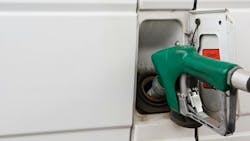Roeth: Moving the MPG needle is part of decarbonization
I’ve been reminding people that moving the needle on miles per gallon is part of decarbonizing the trucking industry. When a truck goes from getting 7 mpg to 7.5 mpg, for example, it is putting less emissions into the air. And when mpg increases to 9, 10, 11, 12 mpg—numbers that are not impossible to achieve—the amount of emissions drops significantly.
Those who disagree with me about 10 mpg being possible should look at the findings from Run on Less 2017. Seven fleets averaged 10 mpg over three weeks, and some saw 12.5 and 13 mpg on some days.
Fuel economy gains don’t just happen. Fleets must invest in technologies and institute practices that help them operate more efficiently. We’ve identified 86 technologies fleets can use to get more miles from a gallon of diesel. However, it can seem daunting to determine which technologies are suitable for a given fleet.
The good news is that since 2012, we have been regularly monitoring the adoption of fuel efficiency technologies by some of the major fleets in North America. It is important to note that all 86 technologies are currently available and not prototypes, validation test units, or pre-production units.
We’ve been publishing a Fleet Fuel Study since 2003, and we’ve found that adopting fuel-saving technologies has gone from 17% in 2003 to 41% in 2022. For each of the studied technologies, we provide a technology adoption curve that shows when fleets adopted the technology.
See also: Roeth: The road to a cleaner freight future is paved with collaboration
With our most recent Fleet Fuel Study, published in 2022, we offered an online benchmarking tool. Fleets can use the benchmarking tool for each technology category they are interested in. They then receive a customized interactive report that includes their responses, prioritized by the technologies that have the greatest gap between the fleet and the average of the Fleet Fuel Study fleets. This tool allows fleets to see where they stand compared to some of the top fleets in the country when it comes to adopting fuel efficiency technologies.
We are in the early stages of gathering data for the next Fleet Fuel Study, which we will publish later this year. The more fleets we have input from, the better. We hope to increase the number of fleets participating in this year’s study. The data is aggregated and anonymized, so fleets don’t need to worry about revealing “the secret sauce” that gives them a competitive advantage. Providing information on technology adoption will help raise the efficiency of more fleets, which in turn will help lower carbon emissions from the transportation of goods by trucks equipped with diesel engines.
If you want more details or wish to participate in the study, please contact Yunsu Park, NACFE’s director of engineering, at [email protected]. He can provide you with more information on the study.
About the Author

Michael Roeth
Executive Director
Michael Roeth is the executive director of the North American Council for Freight Efficiency. He serves on the second National Academy of Sciences Committee on Technologies and Approaches for Reducing the Fuel Consumption of Medium and Heavy-Duty Vehicles and has held various positions with Navistar and Behr/Cummins.
